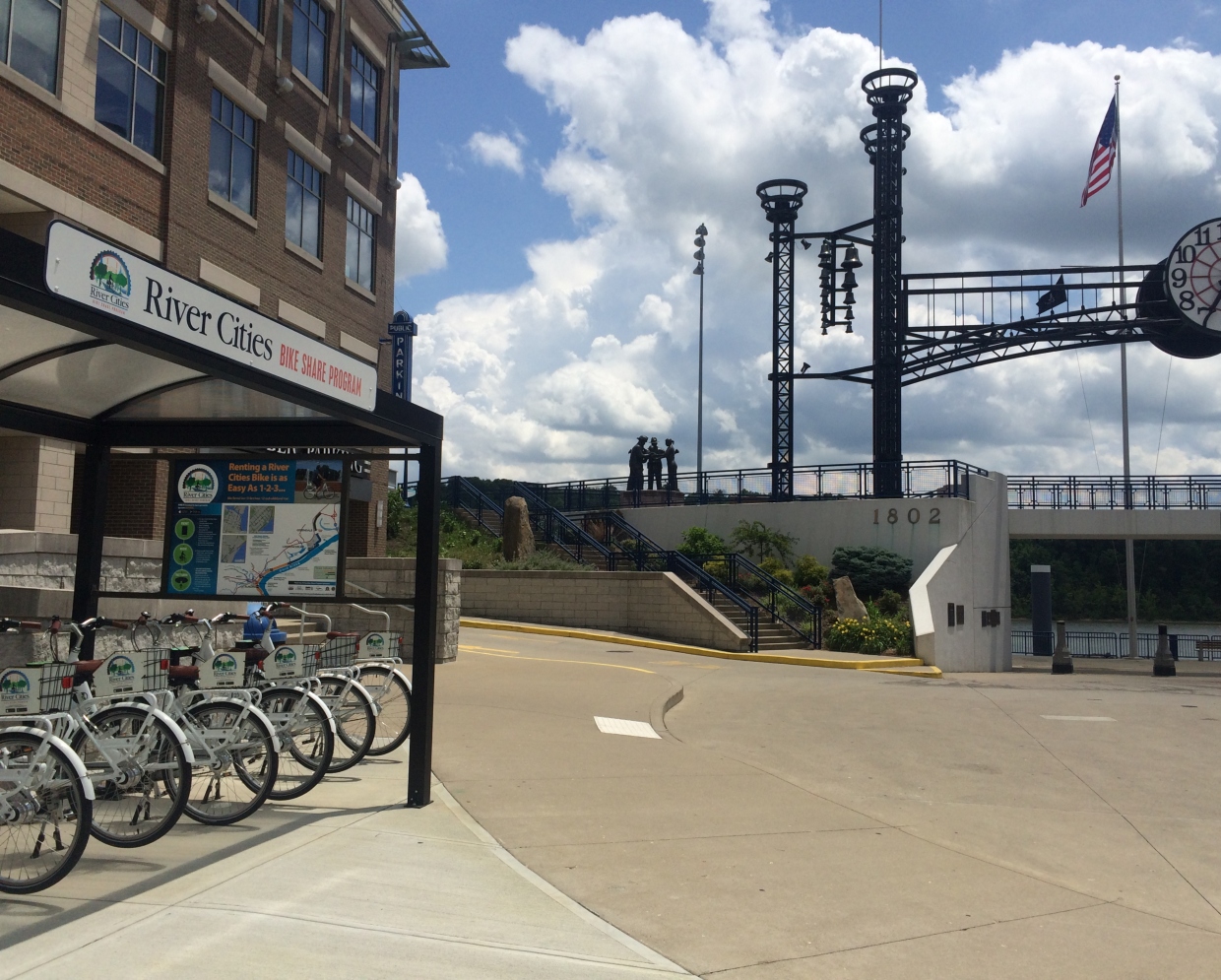Funding
Following approval from the Aurora Park Board to initiate a bike share program, the Aurora City Manager secured approximately $38,000 from the Dearborn County Convention, Visitor & Tourism Bureau, Rising Sun Regional Foundation, Aurora Lions Club International, City of Aurora Endowment and City of Lawrenceburg Community Grant Program.
After successfully raising capital for the City of Aurora Bike Share Program, the neighboring City of Lawrenceburg matched Aurora with $31,000 of local discretionary funds. This partnership between the Cities extended the program into Lawrenceburg, permitting them to allocate 15 bicycles to each City. As equal partners, the Cities of Aurora and Lawrenceburg co-own the program, which cost $49,324. Ongoing costs including software usage and bike and shelter maintenance total $8,050 annually.
The program is also supported by the sponsorship of private organizations who can purchase advertising space on the bike share website and bike shelters. Any revenue received from sponsorship flows back into the donation fund, which is jointly managed by both Cities.
Partnership
The Cities of Aurora and Lawrenceburg are connected by a bike trail along the Ohio River. City of Lawrenceburg Mayor Kelly Mollaun’s decision to join the River Cities Bike Share Program doubled the size of the program and extended the benefits to Lawrenceburg. Under the direction of Aurora’s city manager and Lawrenceburg’s city coordinator/redevelopment director, the River Cities Bike Share Program team is comprised of a small group of employees from both Cities. All program expenses, budgets, and capital improvements must be approved by both Cities.
Dynamic Bicycles provided much of the program hardware and software. Dynamic Bicycles charged $34,500 for 30 ride-and-return bicycles, 30 bike racks, the Movatic Rider App for iOS and Android phones, cloud-based admin software and online training, Bluetooth locking systems permitting rentals via mobile phone, a billing software system and integrated locking mechanisms. Shipping costs an additional $2,400. Dynamic Bicycles provided the billing software system free-of-charge, saving the program $3,000 annually.
The aforementioned bicycle package plus the cost of constructing and maintaining three individual shelters totaled $49,324. The Dearborn County Convention, Visitors & Tourism Bureau, with a $7,000 budget, provided marketing resources.
Each City had its own technology point person who used the Movatic program administration app. The app communicates if the bicycles are online and accounted for, and is a platform for communicating with users. Because the busier stations’ bicycles are used more frequently, they display more wear-and-tear. Program administrators use the mobile app to track rental data to rotate bicycles to ensure the fleets are consistent and no station looks rundown from overuse.
Program leaders developed maintenance contracts with local bicycle shops that require a quarterly maintenance checklist. Additional day-to-day and seasonal maintenance fall under the responsibility of the Cities’ Streets Departments and Parks Departments. General expenses currently include bicycle maintenance fees: $50 per hour for general maintenance, $25 per bi-weekly inspection, $30 per semi-season inspection, occurring twice per season, and $60 per annual inspection per bicycle. In lieu of payment, the bicycle shops have the option to receive marketing and advertising opportunities throughout the community valued at $3,000. The River Cities Bike Share program budgeted $4,000 for annual maintenance.
Ongoing program maintenance also includes managing capital investments, rental revenue and assets, software license renewal and expanding inventory.
Bike Shelters
The Cities installed docking stations, which are comprised of poured concrete, bicycle racks, shelters and advertising. The Cities chose locations adjacent to parking lots to increase visibility and accessibility. Each station has consistent branding and design and includes maps, rental instructions, and website and contact information. The shelters are covered to increase the life of the fleet by protecting them from the elements.
Final Preparations
The Cities of Aurora and Lawrenceburg assembled the bicycles alongside Dynamic Bicycles representatives. Once the Cities installed the stations and assembled the bicycles, the Cities conducted test runs to ensure the components functioned properly. The test runs served a secondary function – training program staff to use the system. After the test runs, the Cities hosted a soft opening by displaying the branding and information about the bike share launch. Next, the Cities hosted a ribbon-cutting ceremony at each station and launched the program.
Pricing
To rent a bicycle, individuals download the free Movatic mobile app, in which they enter their credit card information. Each rental costs $3 for the first hour and $2 for each additional hour. Any revenue generated goes back into the program through the donation fund jointly controlled by both municipalities. The donation fund is used to sustain the ongoing financial needs of the program.
Timeline
From the moment the City of Aurora city manager made the request to start a bike share until the program’s launch spanned approximately two years.



